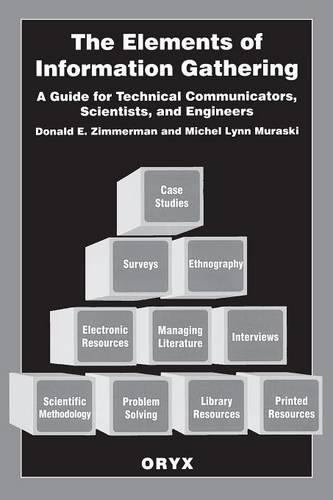
The Elements of Information Gathering: A Guide for Technical Communicators, Scientists, and Engineers
(Paperback)
Publishing Details
The Elements of Information Gathering: A Guide for Technical Communicators, Scientists, and Engineers
By (Author) Michel Muraski
By (author) Donald E. Zimmerman
Bloomsbury Publishing PLC
Greenwood Press
4th December 1994
United States
Classifications
Tertiary Education
Non Fiction
Mathematics and Science
Technology: general issues
001.4
Physical Properties
Paperback
256
Description
There are many "how-to" books on scientific and technical writing, and most of them devote a chapter or two to the subject of gathering information. This book, however, describes the necessary steps in gathering scientific and technical information. College students majoring in technical writing and the sciences are not always familiar with the methods and techniques to this critical element of the research and writing process. "The Elements of Information Gathering: A Practical Guide" is organised into four main sections that lead the reader from the basic principles of information gathering to the more sophisticated methods of locating and organising scientific data. The first part describes strategies for starting an information search. The next part explains the process for retrieving, evaluating and managing literature, or how to organise information gathered in the first steps of the search. The third and fourth parts describe more advanced methods of gathering and analysing primary information from interviews, surveys, usability tests, ethnography, case studies and statistics. The contents also include: identifying and using electronic sources; retrieving government publications; using interlibrary loan service; extracting references and note taking; creating a bibliographic database; considering ethical and legal issues; planning and conducting interviews; analysing and interpreting data; and advanced research and evaluation methodologies.
Reviews
[T]his book's readability, breadth of coverage, clear presentation of information, and jargon-free manner make it suitable to journalists, other communication personnel, and undergraduates. Recommended. * Choice *
[A] wonderful book, comprehensive yet compact, detailed while easy to read. . . . [T]his book has several excellent chapters on using the library. . . . It would be a good review for those in the library field. In addition, the tone of the chapters devoted to libraries is upbeat and respectful. . . . The book flows smoothly between three parts. . . . Librarians who are contemplating research based on this type of approach will find a valuable introduction to the major techniques available. . . . [A]ttractively produced . . . easy to find specific information. . . . It accomplishes this goal with a publication that provides a good overview of the subject without being boring or overly technical. It would be a good addition to many types of libraries, including hospital and academic health sciences libraries. * Medical Reference Services Quarterly *
A comprehensive overview of effective ways to gather the information needed for various kinds of research. . . . Useful diagrams, tables, and an index are included. The book is recommmended for special and academic libraries. * Information Technology and Libraries *
[T]he book is easy to read. It is well designed with specific headings, subheadings and bulleted points that give an almost checklist quality to the book. Using this book as a guide, the inquiring mind will find and gather appropriate information, and therein lies the strength of the work. * The Environmental Professional *
[T]he sturdy techniques described here will get the average college-level researcher well into the master class. * Insights *
[A] far-ranging and information work. . . . The chapters on ethnography/case studies are very well written and demonstrate the range of approaches available in social research. . . . In terms of the intended audiences - technical communicators, scientists, and engineers - the book will serve as a good introduction survey of alternatives for information gathering. . . . The book can be used most effectively in an introductory social research methods course, a course in technical or professional communications, or a course designed to develop information literacy skills. In such courses, faculty would provide the necessary guidance for students. * Library & Information Science Research *
Author Bio
Donald E. Zimmerman, PhD, is professor of technical journalism, Colorado State University, Fort Collins, Colorado, and coauthor of The Random House Guide to Technical & Scientific Communication. Michel Lynn Muraski is an instructor of business communication and professional writing at Colorado State University, Fort Collins, Colorado.
